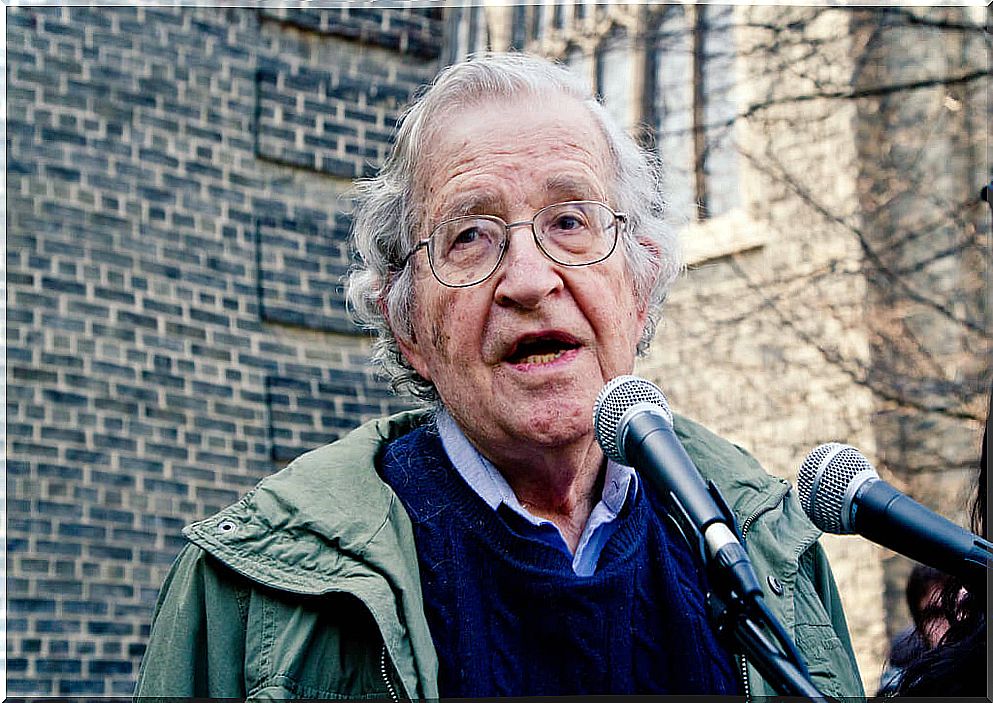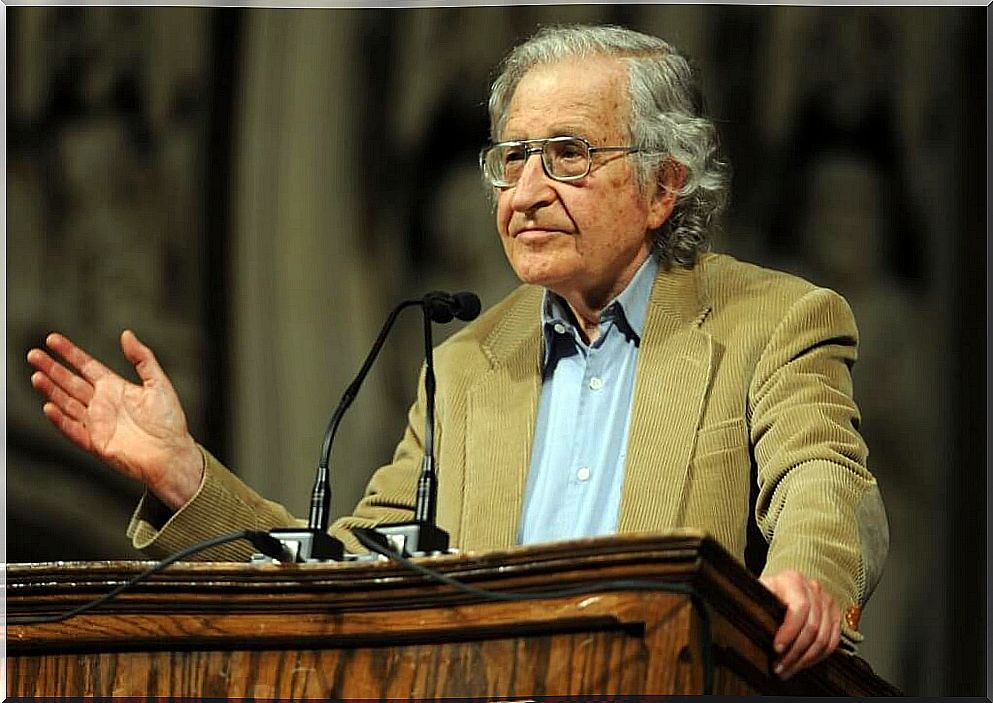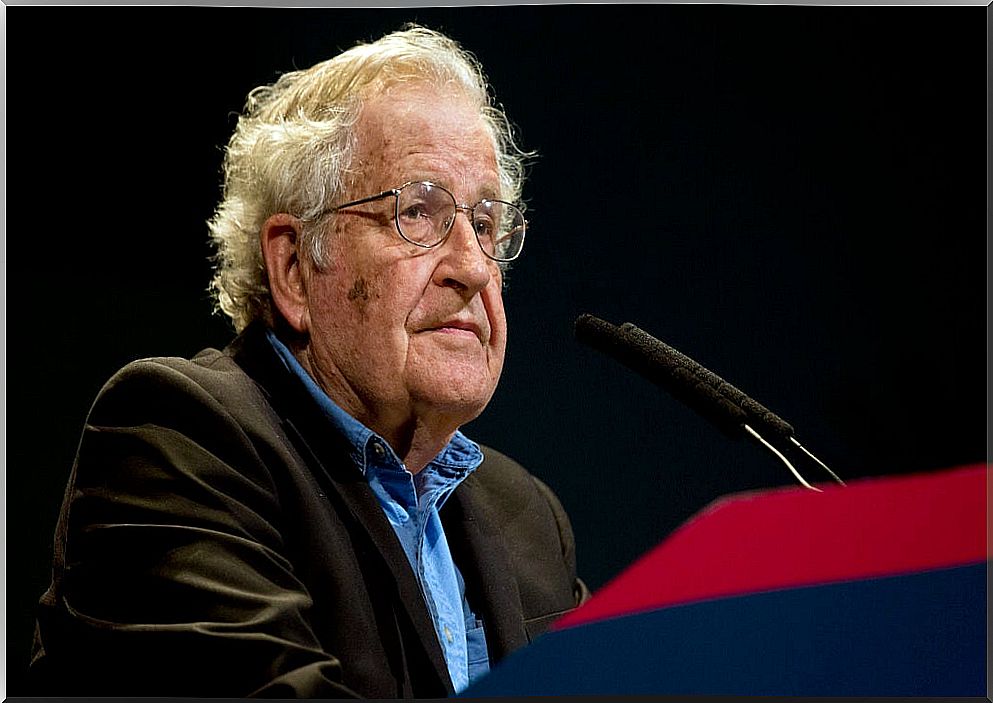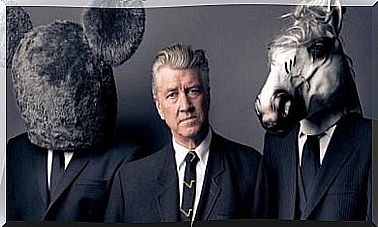Noam Chomsky: Biography Of A Brilliant Mind

Noam Chomsky is one of the greatest minds of the 20th century who, at 91 years of age, continues to write and lecture. He has also been one of the most critical voices in American society against governments, politicians and the established powers.
Linguist, philosopher and political analyst is considered the father of modern linguistics for being the creator of a new model of language description. Chomsky has made great contributions to cognitive science with his theories. The life of this professor emeritus is a journey through history, science and human understanding during the twentieth century. Knowing Noam Chomsky and his work is almost essential to understand the world we live in today.
A multidisciplinary author, who has been listed by the New York Times as “the most important of contemporary thinkers.” An author, despite this, is very controversial, since he has not been exempt from criticism for his postulates against empiricism and his criticism of capitalism. We are facing a fundamental character, whose contributions have influenced such disparate areas as science, politics and psychology ; although, without a doubt, he has turned out to be a true revolutionary in linguistics and, consequently, indispensable for philology.
His early years
Noam Chomsky was born in Philadelphia in December 1928. He was born into a family of Jewish immigrants. His father was a respected Hebrew teacher, who worked in a prestigious school dedicated to the training of Hebrew teachers.
Chomsky spent his childhood between Philadelphia and New York, and was marked by the Great Depression in the United States. Despite belonging to a middle class family, he had the opportunity to witness many social injustices around him. However, he is described as a bright and curious child.
At just ten years old, he witnessed adult conversations about politics and social rights, and his vision of the world was forged then. Around this time, while still a child, he wrote an article for the school on the rise of fascism in Europe after the Spanish Civil War. This article was the basis for a later essay that he would present at New York University. Chomsky, even then, argued that people can understand politics and economics and make their own decisions. Also that authority must be proven before it is considered legitimate and worthy of power. These types of thoughts, developed in his tender youth, have been reflected throughout his work.

His career
Noam Chomsky trained in linguistics, philosophy, and mathematics at the University of Pennsylvania, under the tutelage of Professor Zellig Harris. This and other professors definitely influenced Chomsky’s political ideas. In addition, he was featured at the Harvard Society of Fellows, a group of scholars recognized for their extraordinary potential, who were given distinctive opportunities for individual growth and intellectual collaboration.
Chomsky was moved by what language could reveal about society. He drastically disagreed with approaches that viewed the human mind as a blank slate . For him the basic concepts of language were innate, they were in the minds of all human beings and were only influenced by the syntactic environment of each one. His thesis explored several ideas that, finally, in 1957, he would expose in one of his best-known books on linguistics: Syntactic Structures .
To speak of Chomsky is to speak of generativism and universal grammar. The universal grammar consists, broadly speaking, in the idea that there are certain principles common to all the languages of the world; These principles are therefore innate. When we speak of natural languages, we must emphasize that we also include sign languages, whose acquisition occurs in the same way as in an oral language.
Universal grammar does not mean that all the languages of the world have the same grammar, but that there is a certain innateness in us, a certain predisposition to the acquisition of the mother tongue, whatever it may be. In other words, in our brain there is a predetermined process that, under normal development conditions, will receive the external stimulus of the mother tongue and will trigger this process for its acquisition.
Noam Chomsky’s Syntactic Revolution
Chomsky worked as Emeritus Professor in the Department of Linguistics and Philosophy at MIT (Massachusetts Institute of Technology) for half a century, before retiring from active teaching in 2005. He has also been a visiting professor at other universities such as Columbia, OCLA, Princeton. and Cambridge.
One of his most famous contributions was his hierarchy system. A division of grammar into groups, moving up or down in their expressive abilities. This hierarchy is linked to generative grammar, which seeks to answer why certain syntactic combinations are possible in a language and others give us an ungrammatical result.
Generative grammar, however, is not prescriptive, but descriptive. That is, it does not pretend to postulate what is correct and what is not; rather, it seeks to define what rules and principles a speaker follows to determine and produce all possible sentences in their language. Chomsky observes that, in each language, we can produce and understand an infinite number of sentences; As a consequence, we start from an internal, innate grammar, that is, a finite mechanism of knowledge with infinite possibilities.
These theories and the Chomskyan hierarchy, beyond their obvious contributions to linguistics, have had enormous influence on modern psychology and philosophy; They help to understand human nature and how information is processed.

Politics and controversies
In 1967, Noam Chomsky published an essay entitled The Responsibility of the Intellectuals , protesting the US intervention in Vietnam. This essay was followed by others on political analysis, published sporadically. His political and social vision of the world has been a constant that has always worked in parallel with his studies in linguistics and cognitive science, which has also generated numerous criticisms from the most extreme political and intellectual factions.
His many books on political analysis include American Power and the New Mandarines ( 1969), Peace in the Midwest? (1974) and Manufacturing Consent: The Political Economy of the Media (1988). Today, Noam Chomsky remains a highly respected and controversial thinker who remains active in lecture circles. He has accumulated numerous academic and humanitarian awards, including the American Psychological Association Distinguished Scientific Contribution Award and the Sydney Humanitarian Peace Award.
In short, he is a controversial but undoubtedly prolific author. He has harshly criticized capitalism and especially the American system. We can be more or less in agreement with his theories, but the undoubted thing is that his contributions have been really relevant and have served various fields. Currently, his work focuses more on political activism, but without neglecting his passion for knowledge and research.









